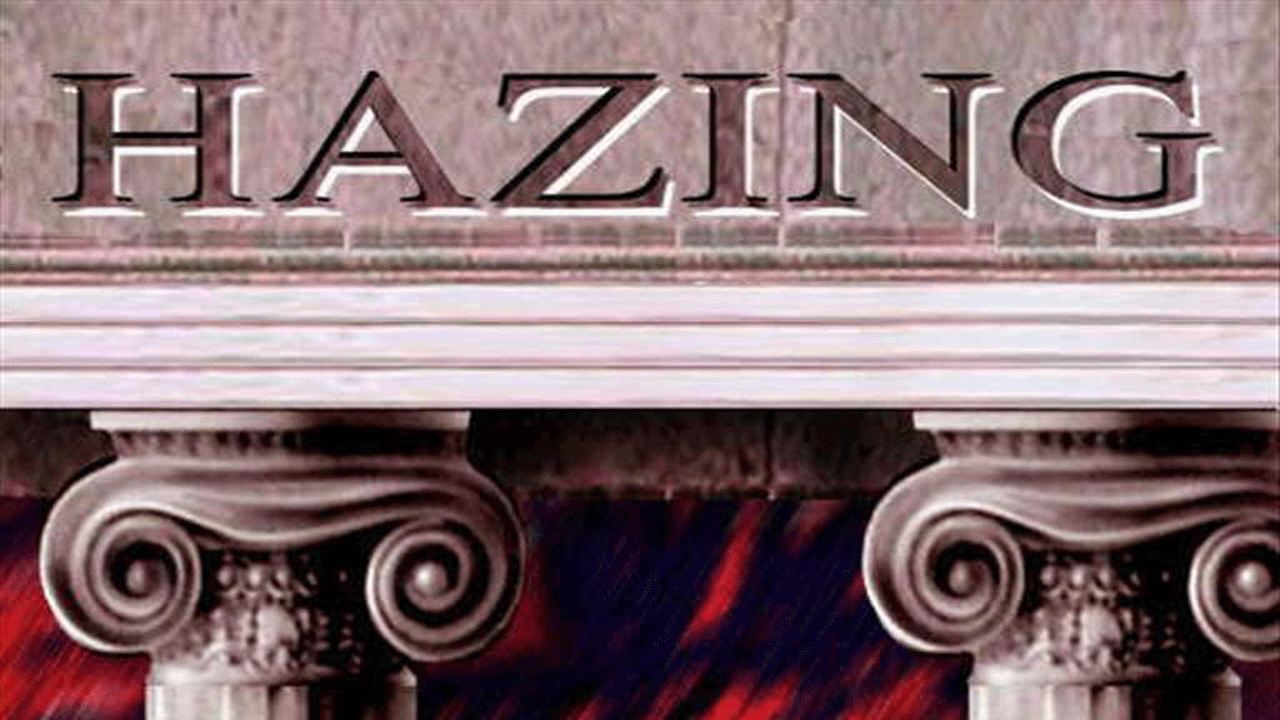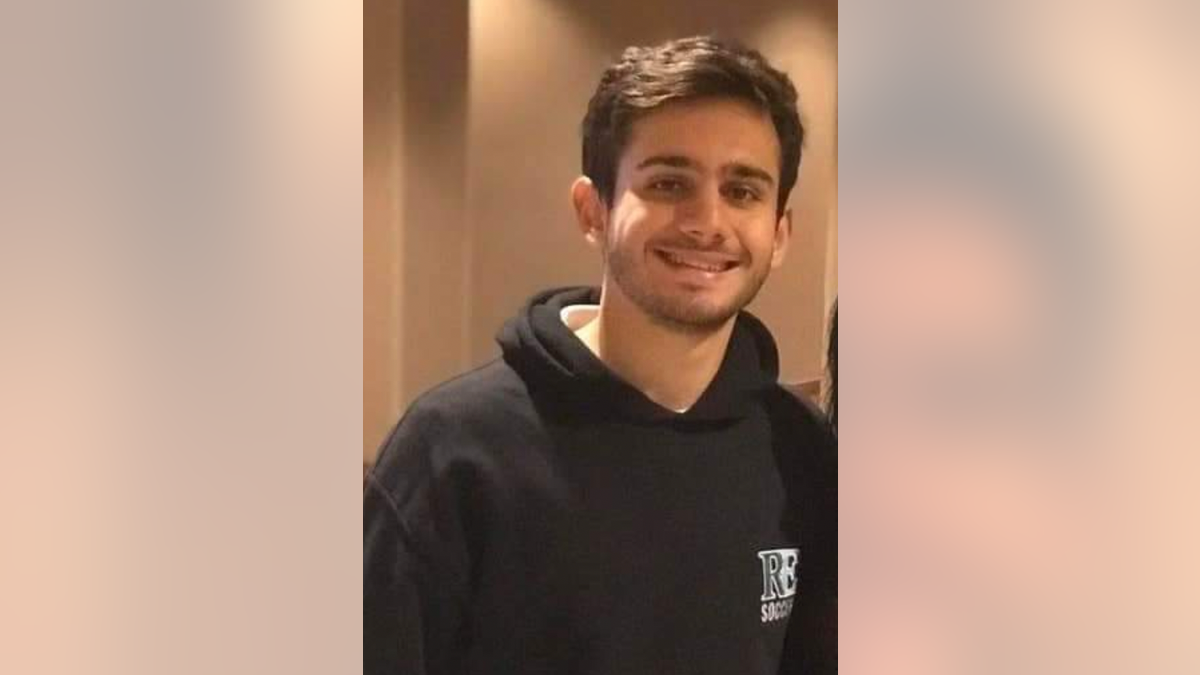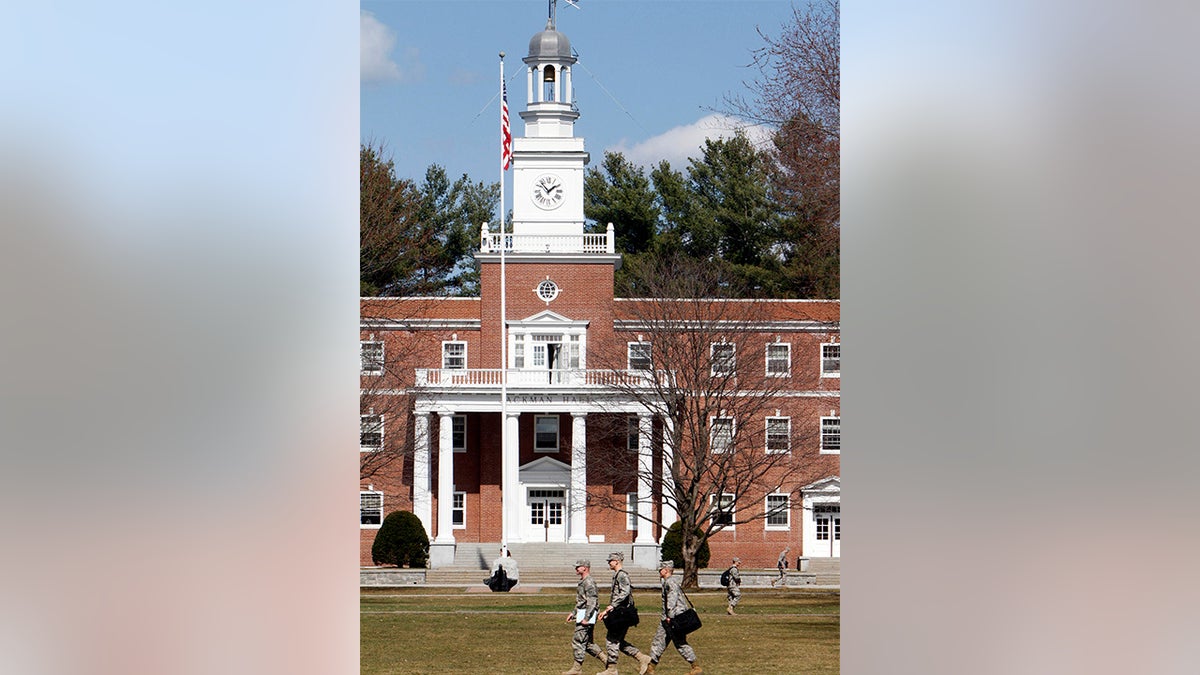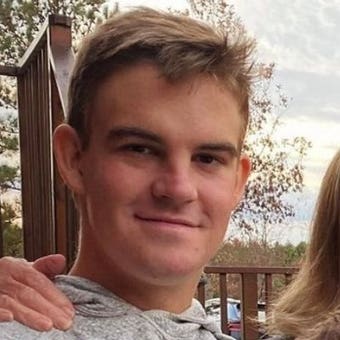Mizzou alleged frat victim's lawyer: 'This is a slam-dunk hazing case'
The family of 19-year-old brain injury victim Danny Santulli speaks out on the dangers of fraternity hazing and seeks justice on 'The Story.'
Hazing, the practice of subjecting new members of a group to varying degrees of degradation for the supposed sake of building solidarity, has been around for centuries and can be found in street gangs, the military, sports teams and numerous other organizations.
In recent years, a string of tragic deaths related to the hazing of young men, many of them just 18 or 19 years old, has brought increased attention to the dangers of hazing at fraternities in the United States.
The first death from hazing at an American university likely occurred in October 1873. Mortimer M. Leggett, a student at Cornell University who wanted to join Kappa Alpha, was being led blindfolded by two members of the fraternity when he fell off a cliff near campus, fracturing his skull and dislocating his neck.
The New York Sun wrote in an Oct. 17, 1873 report that "it had been alleged that they were out hazing," but witnesses testified "hazing was not the object of the evening’s excursion, and that the poor victim was being initiated into some college society."
WVU SUSPENDS PI KAPPA PHI OVER REPORTED HAZING INCIDENT

Hazing has been a problem at colleges for over a century. (Associated Press)
Elizabeth Allan, a University of Maine professor of higher education, found in a 2008 study that about 55% of college students involved in campus clubs and organizations reported some form of hazing. By 2018, Allan found that number had dropped to about 26% at seven schools that are a part of the Hazing Prevention Consortium, a group of schools that have committed to stopping hazing.
"We looked at a wide range of clubs, teams and organizations. The students were reporting hazing in performing arts groups, marching bands, a cappella groups, honor societies. It really varied," Allan told Fox News Digital.
While the types of clubs varied, hazing at fraternities has gotten the most attention because they generally have the most tragic outcomes.
"The majority of the most lethal cases are fraternities," Allan said.
Adam Oakes
Adam Oakes entered college at Virginia Commonwealth University at the height of the coronavirus pandemic in the fall of 2020 with tough restrictions in place that kept students sequestered in their dorm rooms.
Fearing he was missing out on the college experience, Adam decided to rush Delta Chi. A search of Greek life at VCU quelled most concerns his parents had about their freshman son joining a fraternity.
"When he told us about joining a fraternity, I went on the VCU Greek Life page, and all you saw were kids smiling and happy," Eric Oakes, Adam's father, told Fox News Digital.
Just four days after getting his bid, Adam attended an event on the evening of Feb. 26, 2021, to find out who his "big brother" would be at an off-campus house. He was given a bottle of Jack Daniels whiskey and instructed to drink it.
He was unconscious about an hour later and never woke up. A medical examiner ruled that he died of alcohol poisoning.
"He was the type type of kid that when he walked into the room, you just immediately smiled because he greeted you with a big smile. And he was just happy to see you. And you were just happy to see him," Eric said.
"It's time to make a change. When somebody like Adam dies, there's something really, really wrong."
UNIVERSITY STUDENTS IN BIG CITIES WITH SURGING CRIME AFRAID TO LEAVE CAMPUS
Charges were dropped this week against five former Delta Chi members who were each facing a count of hazing. Six of them earlier pleaded guilty or no contest.
Stone Foltz
Stone Foltz died just weeks after Oakes in March 2021 at Bowling Green State University under similarly grim circumstances.
The 20-year-old rushed Pi Kappa Alpha and was pressured to drink an entire bottle of alcohol at a fraternity initiation event the evening of March 4, 2021.
Foltz, who was a sophomore, was dropped off by members of the fraternity at his apartment, and his roommate found him unconscious the next morning. He died three days later after being placed on life support.
Two members of Pi Kappa Alpha, which is now banned at Bowling Green State University, were convicted of hazing and failure to comply with underage alcohol laws, while six others pleaded guilty to various charges.
"What they did was cruel, senseless and destructive — to their lives and ours — and it wasn’t done in secret," Foltz’s parents, Cory and Shari Foltz, told Fox News Digital earlier this month. "We demand accountability, not just for Stone, but for every parent across the country who is dropping off their child at college."
Antonio Tsialas
Antonio Tsialas was an 18-year-old freshman at Cornell University when he attended a Phi Kappa Psi event Oct. 24, 2019, called "Christmas in October." It required young men rushing the fraternity to drink large amounts of alcohol in different themed rooms over a short period of time, according to his family.
The event took place over parents' weekend, and the Miami native had dinner with his mom earlier in the evening. When he didn't show up to meet her the next morning, she became concerned and reported him missing at a Cornell police station.

Antonio Tsialas was found dead at the age of 18 in a ravine near the Cornell University campus after being instructed to drink at a fraternity event, his parents said. (New York State Police)
The next day, he was found dead at the bottom of Fall Creek Gorge. A medical coroner ruled Tsialas died of blunt force trauma and had consumed alcohol.
The Cornell University Police Department said it followed up on nearly 100 leads and conducted 150 interviews but determined that foul play wasn't involved and closed the investigation a year later.
TEXAS HIGH SCHOOL HAZING INCIDENT WITH HOT SAUCE, LAP DANCES SENDS STUDENT TO EMERGENCY ROOM
Tsialas' family is still searching for answers.
"We know for certain that he spent several hours at the Phi Kappa Psi hazing event, but no one has come forward to tell us what happened to Antonio after he left the fraternity house that night," his family wrote a year after his death.
Hazing at Norwich University
Norwich University, America's oldest private military college known as the birthplace of the Reserve Officers' Training Corps, banned Greek life 60 years ago, but that hasn't stopped students from being hazed.
Students on the women's rugby team are under investigation for an alleged hazing incident that involved waterboarding and branding with hot pliers, according to court documents.

In this March 21, 2012 photo, cadets cross the parade ground at Norwich University in Northfield, Vt. Norwich University is the nation's oldest private military academy. (AP Photo/Toby Talbot)
CLICK HERE TO GET THE FOX NEWS APP
A police officer was originally called to the campus March 20, 2022, on a report of someone being held at knifepoint. The victim told the officer that rugby teammates branded her with heated pliers while she was heavily intoxicated. When the officer checked the woman's phone, the officer allegedly found a video of another woman allegedly being waterboarded.
Five students were cited for hazing in May, in addition to other charges. One of them pleaded not guilty to a misdemeanor count of simple assault, while another pleaded not guilty to reckless endangerment.
Fox News' Stephanie Pagones and Michael Ruiz contributed to this report, as well as the Associated Press.






















